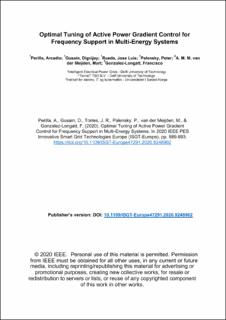Optimal Tuning of Active Power Gradient Control for Frequency Support in Multi-Energy Systems
Perilla, Arcadio; Gusain, Digvijay; Rueda, Jose Luis; Palensky, Peter; A. M. M. van der Meijden, Mart; Gonzalez-Longatt, Francisco
Chapter
Accepted version
Permanent lenke
https://hdl.handle.net/11250/2766448Utgivelsesdato
2020Metadata
Vis full innførselSamlinger
Originalversjon
Perilla, A., Gusain, D., Torres, J. R., Palensky, P., van der Meijden, M., & Gonzalez-Longatt, F. (2020). Optimal Tuning of Active Power Gradient Control for Frequency Support in Multi-Energy Systems. In 2020 IEEE PES Innovative Smart Grid Technologies Europe (ISGT-Europe) https://doi.org/10.1109/ISGT-Europe47291.2020.9248902Sammendrag
Coping with severe active power imbalances constitutes a challenging task in low inertia multi-energy systems. The phase out of the majority of conventional power plants with large size synchronous generators entails that power electronic interfaced devices should take over the primary task of active power balance-frequency control. In view of this, the active power gradient (APG) control of these devices should be carefully designed to ensure effectiveness and to prevent collateral effects on other stability phenomena. This paper presents two novel formulations for the optimal tuning of the parameters of the APG controllers. Both formulations are defined as a constrained single objective optimization problem. The goal is to optimally manage the APG controllers to quickly bound the instantaneous frequency deviations excited by a large active power imbalance. The first formulation concerns with the minimization of the instantaneous variation of the kinetic energy of the synchronous areas of an interconnected system, whereas the second formulation concerns with the minimization of the spatial displacements between the dynamic trajectories of the time frequency responses in different synchronous areas. The formulations are solved by using a new proposed variant of the mean-variance mapping optimization algorithm (MVMO), and their conceptual implications are illustrated based on numerical simulations performed on a small-size multi-energy system.
